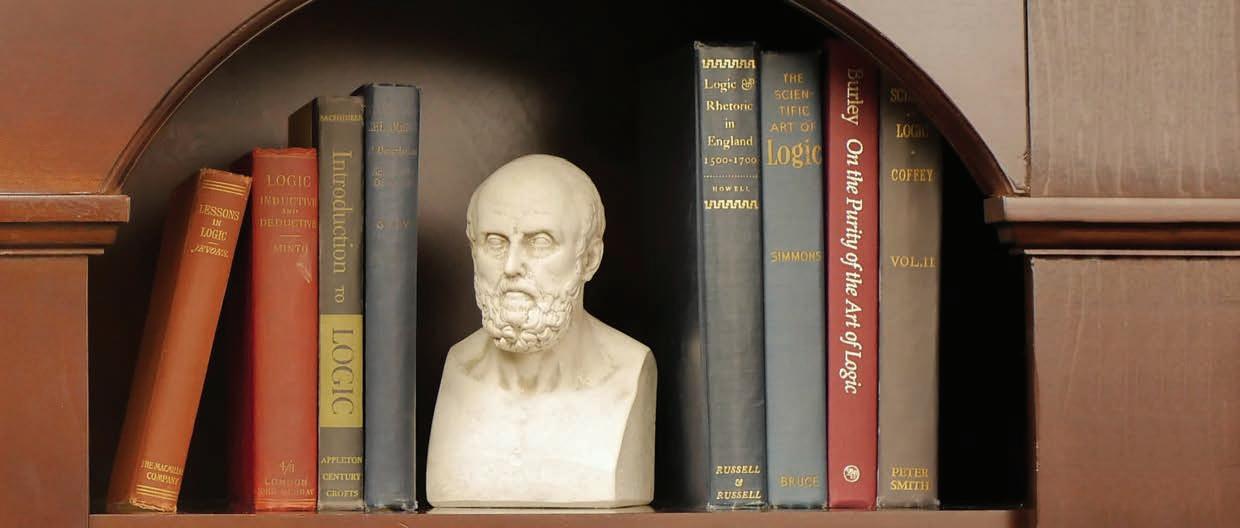
6 minute read
On Vulcans and Androids by Dr. Dan Sheffler
ON VULCANS AND ANDROIDS
by Dr. Dan Sheffler
Science fiction has made popular a certain trope concerning us logicians. The common depiction is that logic is somehow cold and calculating, the activity of a merely robotic kind of intelligence. In the original Star Trek, Dr. Spock captures this stereotype with his pointy-eared precision. In The Next Generation, the role is taken over by the literalist android Data. Both series feature ongoing plots that involve these characters grappling with love and emotion, which are viewed as the truly human side of life, in tension with logic. Data even learns to dream.
Students sometimes assume that this is the point of logic class: Emotions get you into trouble, so your parents want you to be more like Spock. The unfortunate side effect of the treatment is that you will be less fun at parties.
In defense of logicians everywhere, especially those passionate, very-fun-at-parties Platonic logicians, I submit that this stereotype misses a deep truth about the nature of the human soul. In his well-known essay, "Plato's Theory of Desire," Charles Kahn argues that the strict separation between non-rational desires that motivate us and merely logical thoughts that leave us cold can be traced to Enlightenment thinkers such as Hobbes and Hume. By contrast, the classical theory of Plato sees reason itself as a particular kind of love.
In the Republic, Socrates famously divides the soul into three parts: (i) the "rational" part, logistikon; (ii) the "irascible" part, thymoeides; and (iii) the "appetitive" part, epithymetikon. When Socrates claims that the
Dr. Dan Sheffler is a professor of philosophy with Memoria College and has taught philosophy, logic, Latin, and history at the University of Kentucky, Georgetown College, and Asbury College. first of these parts ought to rule over the other two, students frequently come away with the impression that the ideal soul is of the Spock type. This impression is sometimes reinforced when students read from translations that choose to render logistikon as the "calculating" part—as though Socrates would have us become a kind of human adding machine.
As Kahn points out, however, this typical summary of the Republic neglects to mention that the first part of the soul is also frequently called by other names. Socrates first introduces it under the name philomathes, "that which loves to learn," and he also calls it philosophon, "the lover of wisdom." By contrast, the other parts of the soul are distinguished as their own types of love. The irascible part loves winning and honor (philonikon and philotimon), while the appetitive part loves acquisition and pleasure (philokchrematon).
We should not, therefore, understand the conflict between the three parts of the soul as a conflict between cold, calculating reason on the one hand and the warm, alluring impulses arising from the irascible and appetitive parts on the other. Instead, the conflict is a dynamic struggle inside our soul between three distinct kinds of burning desire. According to Socrates, the kind of person we end up being hangs on the answer to the question, "Will the love for truth and wisdom win out over the love for the other two parts?" All these loves are full of force and emotion, and the battle is won by strength and ardor, not by calculating tricks of the android mind. We need a turning of the soul, a kind of repentance, from one set of loves toward the higher love of wisdom. The Platonic model does not, therefore, present us with an ideal of detachment, but rather an ideal of conversion.

What then, specifically, are we called to love when Socrates calls us to love learning and wisdom? And how does a classical logic classroom cultivate this kind of love?
At the summit of the Republic, Socrates leads us to the final goal of his (fifty-year-long!) program of education when he describes the Allegory of the Sun. According to this allegory, just as the sun sheds light on everything, making things visible and giving all plants the nourishment they need for life, so too the Good sheds its rays on everything, making them knowable and sustaining all things in existence. All those years of training in gymnastics, in music, and in mathematics in the Republic lead to this moment, a final vision of that ultimate reality at the foundation of everything—a foundation that is in itself pure Goodness. All along, every true educational endeavor has been driven by a longing for this kind of truth.
Even the arch-modern Nietzsche recognizes that
… it is still a metaphysical faith upon which our faith in science rests—that even we knowers of today, we godless anti-metaphysicians, still take our fire, too, from the flame lit by the thousand-year old faith, the Christian faith which was also Plato's faith, that God is truth; that truth is divine (translated by Josefine Nauckhoff).
When Socrates describes, therefore, a love of learning, we should not imagine the kind of bookish individual who loves to cram his brain with little facts so that he can always win at Trivial Pursuit. Instead, we should imagine the Sage with a capital S who has devoted himself utterly to a knowledge of the Truth with a capital T and a life lived by its light. For Socrates, the very basis of logic cannot be conceived apart from this ultimate Truth, and our very capacity for logic cannot be conceived apart from our yearning for it. As Kahn puts it, "The rational desire for what is good just is the rational part of the soul."
I think many of us can stand to improve our logic classrooms in light of this, especially in our choice of examples. I know it's easy to throw together a categorical syllogism using whatever random nouns come first to mind. All apples are fruit; all fruits are plants; therefore, all apples are plants. Certainly, the students need lots of repetition, and most of our exercises will, of necessity, be rather pedestrian. Nevertheless, we can seek out little opportunities to illustrate for the students that the discipline of logic is simply one necessary component in the lifelong striving of the soul after the Ultimate Good. The striving after the Ultimate Good is the striving toward God. All logic is the striving after the Ultimate Good. Therefore, all logic is the striving toward God.
Most of all, we can model in our own person the love affair we have with the Truth. On most days the voice of the lecturer has that tone which, if it became a color, would be olive drab. Smile a little. Wear a tie (preferably not in olive drab). Let your guard slip. Let the students see the white hot sacred flame as your real motive for teaching them.
Henceforth, I hope that we can put to rest the idea that logic class is an education fit only for Vulcans and androids. I also hope that we can put to rest the idea that there is a perpetual conflict between the "head," incorrectly understood as logic, and the "heart," incorrectly understood as love. Instead, let us teach logic as one central discipline, along with all the other components of a classical education, training the student's soul in the highest of all loves.










